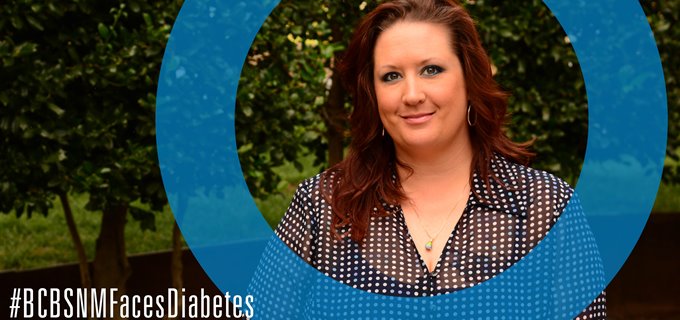Search for a doctor or hospital in your network.


Search for a doctor or hospital in your network.

Get News & Updates Directly To Your Inbox
“I went in for a routine glucose screening,” she recalls. “Unfortunately, I tested positive, so had to take a glucose tolerance test (GT). It was positive, too, and I was diagnosed with gestational diabetes. I’d never known anyone with gestational diabetes, so I definitely wasn’t prepared for what was to come.”
Angela’s care provider quickly sent her to a dietician. She also attended a gestational diabetes education class with other pregnant women. “It taught us basic nutritional information. We focused on the intake of sugars and carbohydrates and the body’s response to them.”
Outfitted with glucose monitors and test strips, Angela and the other moms-to-be learned how to take and record their blood sugar readings. Food logs helped them track every beverage, snack and meal they consumed over a two-week period – along with logging their pre- and post-meal blood sugar levels.
“At the end of those two weeks, I met one-on-one with the nutritionist so she could review my food log and blood sugar readings,” Angela explains. “Although I’d been very disciplined and done everything exactly as I was asked, she determined that diet alone was not controlling my blood sugar.”
Angela admits the news made her feel emotional. “I felt that in some way, it was all my fault. I was extremely concerned about the health of my baby.”
Her care providers reassured Angela that extreme fluctuations in hormones – normal during pregnancy – was the reason her body was having trouble controlling her blood sugar. It wasn’t anything she had done.
During her first visit with an endocrinologist, Angela learned she would need to begin insulin injections.
“During pregnancy, you can’t take oral treatments like people with Type 2 diabetes,” she notes. “I had to immediately begin giving myself insulin injections directly into my stomach about 5-10 minutes before each meal. As someone who has always had an extreme fear of needles, the whole process quickly helped me overcome that fear.”
Eight blood sugar readings per day became Angela’s new normal – one first thing in the morning, two at breakfast, two at lunch, two at dinner and one before bed.
“I also saw the endocrinologist every week for the remainder of my pregnancy. During each visit, he would review my blood sugar readings and adjust the insulin dosage accordingly. In my case, it was always my morning numbers that seemed to be most impacted by my diabetes,” she adds.
During the last two months of her pregnancy, weekly visits with her OB/GYN monitored the size of Angela’s baby. “Babies of mothers with gestational diabetes can grow quite large leading to early labor and C-section delivery. Thankfully, I was able to carry my baby to term and have a normal delivery.”
After Angela’s son was born, the hospital staff closely monitored the blood sugar of both mom and baby. Angela received insulin injections after meals, and was put on a diabetic diet while in the hospital. Both were released from the hospital once Angela’s son had three consecutive normal blood sugar readings – which happened on the second day.
For mom, it took a bit longer. “It was about two months after he was born before my blood sugar levels returned to normal.”
Angela was committed to nursing her newborn son for as long as possible. “Most importantly, because it was best for him, but also because breast feeding reduces the risk of developing Type 2 diabetes.”
Six years later, Angela is still living without diabetes. She is thankful for having the quality medical care she needed to manage her gestational diabetes.
“If it was not for that BCBS card in my pocket, I don’t know how I would have survived it all. The process was so stressful. I couldn’t image doing it without outstanding coverage. I credit the success of my pregnancy and delivery to early detection, following the guidance of health professionals and ongoing, routine physician care.”
Originally published 10/26/2017; Revised 2023
Blue Cross and Blue Shield of New Mexico, a Division of Health Care Service Corporation,
a Mutual Legal Reserve Company, an Independent Licensee of the Blue Cross and Blue Shield Association
© Copyright 2025 Health Care Service Corporation. All Rights Reserved.
Verint is an operating division of Verint Americas, Inc., an independent company that provides and hosts an online community platform for blogging and access to social media for Blue Cross and Blue Shield of New Mexico.
![]() File is in portable document format (PDF). To view this file, you may need to install a PDF reader program. Most PDF readers are a free download. One option is Adobe® Reader® which has a built-in screen reader. Other Adobe accessibility tools and information can be downloaded at https://www.adobe.com/trust/accessibility.html.
File is in portable document format (PDF). To view this file, you may need to install a PDF reader program. Most PDF readers are a free download. One option is Adobe® Reader® which has a built-in screen reader. Other Adobe accessibility tools and information can be downloaded at https://www.adobe.com/trust/accessibility.html.![]()
![]() You are leaving this website/app ("site"). This new site may be offered by a vendor or an independent third party. The site may also contain non-Medicare related information. Some sites may require you to agree to their terms of use and privacy policy.
You are leaving this website/app ("site"). This new site may be offered by a vendor or an independent third party. The site may also contain non-Medicare related information. Some sites may require you to agree to their terms of use and privacy policy.
Powered by Verint